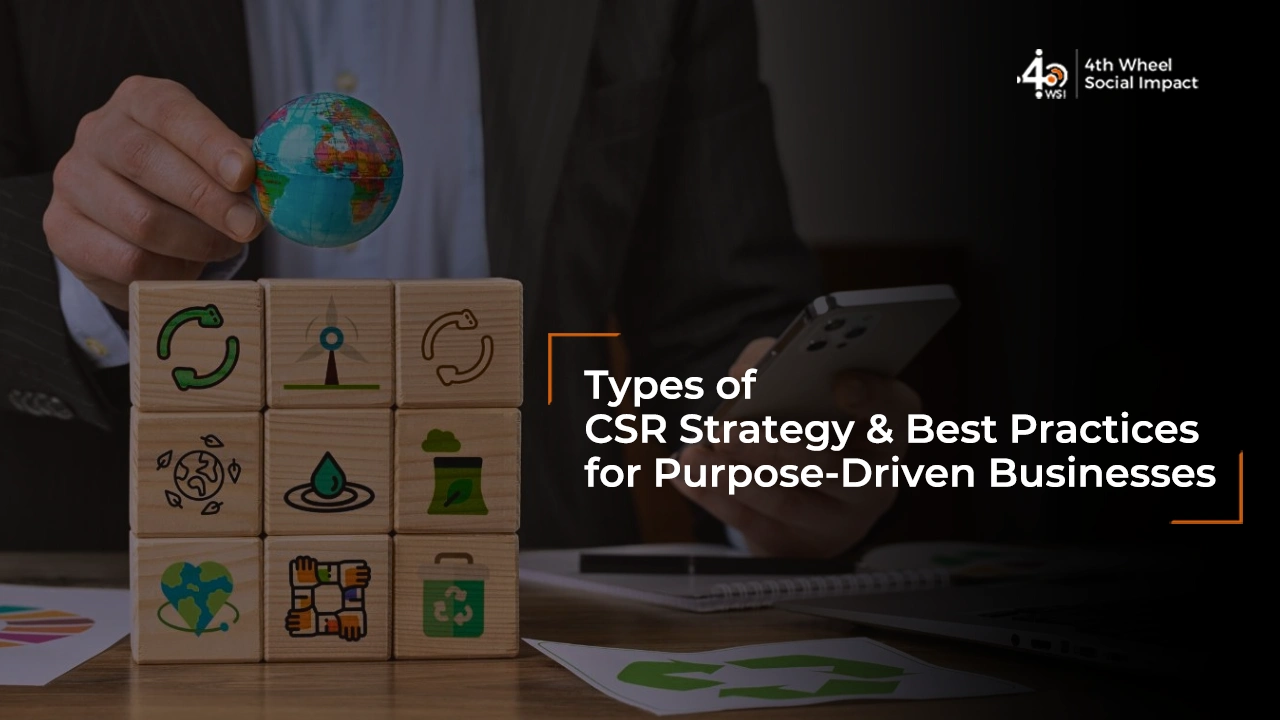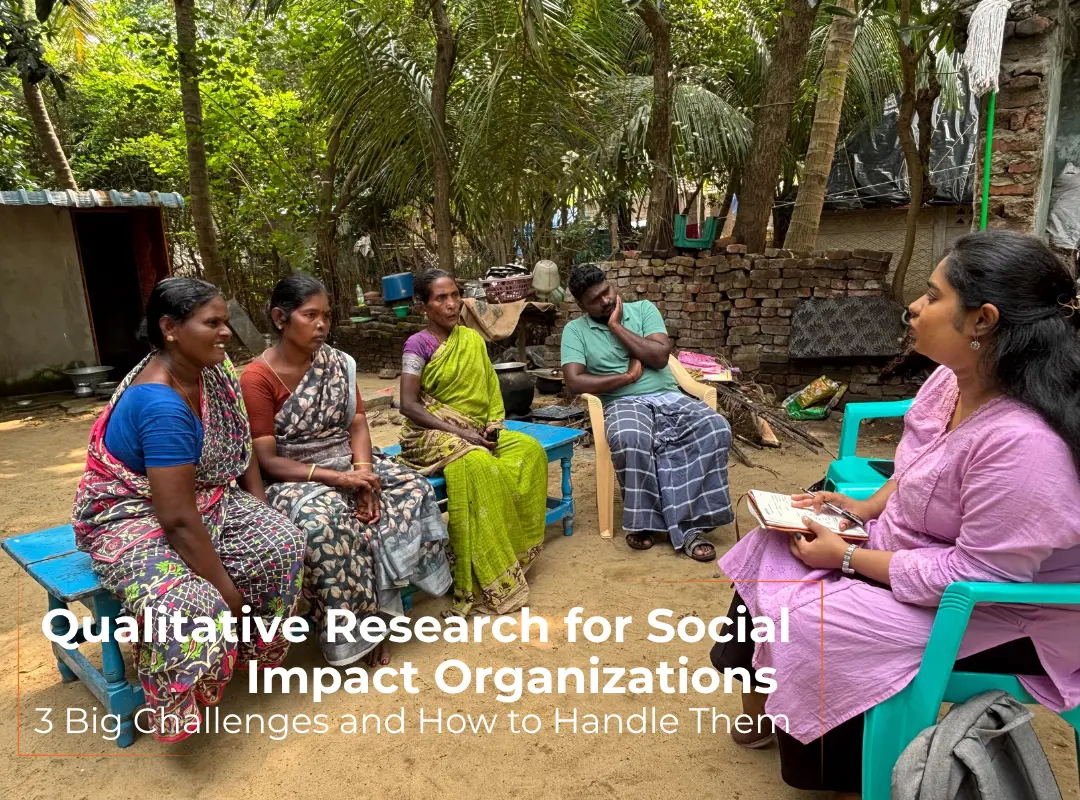Corporate Social Responsibility (CSR) has evolved from a peripheral business practice to a critical strategic imperative. Modern organizations recognize that meaningful CSR strategies are not optional add-ons but fundamental approaches to building sustainable, purpose-driven businesses.
As a CSR consulting firm, The 4thWheel has guided numerous companies through developing robust strategies for corporate social responsibility that create genuine value for both business and society.
The most successful companies understand that types of corporate social responsibility extend far beyond traditional philanthropy. They represent comprehensive approaches to addressing social and environmental challenges while driving business innovation and growth.
Our work has shown that well-designed CSR programs can transform organizational culture, strengthen stakeholder relationships, and create competitive advantages.
Table of Contents
What is CSR Strategy?
A CSR strategy is a systematic, comprehensive plan that aligns a company’s social impact goals with its core business objectives. It’s not a one-size-fits-all approach but a tailored framework that reflects an organization’s unique capabilities, values, and potential for creating positive change.
Key components of corporate social responsibility typically include:
- Clear social and environmental impact objectives
- Alignment with core business strengths
- Measurable goals and performance indicators
- Stakeholder engagement mechanisms
- Integration across organizational operations
Think of a CSR approach as a company’s strategic compass. It guides decision-making, resource allocation, and long-term planning to make sure that social impact is not an afterthought but a fundamental business consideration. Unlike sporadic charitable activities, a comprehensive CSR strategy creates systematic, sustainable approaches to addressing social challenges.
Benefits of CSR Strategy for Long-Term Business Growth
By integrating social impact into core business strategy, organizations move beyond transactional philanthropy toward transformative approaches that create shared value. The most successful CSR approaches don’t just give back. They also fundamentally rethink how business can be a positive force for societal progress. Companies investing in thoughtful CSR initiatives experience multiple strategic advantages:
Talent Attraction and Retention
Modern professionals, especially younger generations, seek purpose-driven employers. A robust CSR plan helps attract top talent who want to work for organizations making meaningful contributions beyond financial performance.
Brand Reputation and Customer Loyalty
Consumers increasingly support brands demonstrating genuine commitment to social and environmental causes. CSR efforts that authentically address critical challenges can differentiate your brand in competitive markets.
Risk Mitigation
Proactive CSR practices help organizations anticipate and address potential environmental, social, and governance risks before they become substantial problems. This forward-thinking approach protects organizational reputation and operational stability.
Innovation Catalyst
Engaging with social challenges often generates insights that lead to new products, services, and business models. CSR goals can spark creative problem-solving across organizational teams and lead to organic capacity development.
Investor Confidence
Impact-oriented investors evaluate companies based on environmental, social, and governance (ESG) criteria. Strong CSR initiatives signal organizational resilience, strategic thinking, and long-term value creation potential.
Operational Efficiency
Many CSR campaigns focused on resource conservation simultaneously reduce costs and environmental impact. Sustainable practices often reveal opportunities for process improvements and cost savings.
Stakeholder Relationships
Consistent, transparent CSR strategies build stronger connections with communities, regulators, nonprofit partners, and other critical stakeholders. These relationships create broader support networks and potential collaboration opportunities.
As a trusted CSR consulting firm, we help organizations build strategies that go beyond compliance or branding to ones that drive measurable, long-term impact.
The 5 Main Types of CSR Strategy
Understanding types of corporate social responsibility requires recognizing how different approaches create meaningful social impact. Each CSR strategy represents a unique approach to addressing societal challenges:
1. Philanthropic Strategy
The most traditional CSR approach involves direct charitable contributions. Companies donate funds, resources, or employee time to support community needs. While well-intentioned, this strategy often lacks deep integration with core business objectives. Upon deeper impact evaluation, the milestones achieved often fall short of attaining long-term societal change.
2. Ethical Strategy
This CSR plan focuses on maintaining high ethical standards across business operations. It encompasses fair labour practices, transparent governance, responsible supply chain management, and commitment to human rights. Ethical strategies make sure that a company’s core operations and practices align with its social responsibility principles.
3. Environmental Strategy
Organizations adopting this CSR strategy prioritize ecological sustainability. CSR initiatives might include reducing carbon footprints, implementing renewable energy solutions, minimizing waste, and developing environmentally friendly products. These efforts address critical global challenges like climate change and resource conservation.
4. Economic Strategy
An economic CSR approach links social impact with business growth. Companies create economic opportunities through inclusive business models, supporting local entrepreneurs, providing skill development programs, and investing in communities where they operate. This strategy views social development as a pathway to economic empowerment.
5. Hybrid/Integrated Strategy
The most sophisticated CSR practices combine multiple approaches to deliver the most resonating results. Companies develop comprehensive strategies that integrate social impact across business functions. These corporate social responsibility models align organizational capabilities with societal needs to create sustainable, mutually beneficial solutions.
Interesting Reads: 10 Key Elements of a Strong CSR Strategy Every Business Should Follow
5 Best Practices to Build a Strong CSR Strategy

Align with Core Competencies
Effective CSR goals leverage an organization’s unique strengths. Companies should design CSR initiatives that reflect their expertise, resources, and industry context. This approach provides a more meaningful and sustainable social impact.
Establish Clear Metrics
Successful CSR practices require measurable objectives as well as routine monitoring & evaluation. Develop specific, quantifiable indicators that track social and environmental progress. These metrics help demonstrate the tangible value of CSR efforts and guide continuous improvement.
Engage Stakeholders
Comprehensive CSR campaigns involve continuous dialogue with diverse stakeholders. Consult employees, community members, nonprofit partners, and customers to understand genuine social needs. This collaborative approach improves the relevance and effectiveness of CSR initiatives.
Integrate Across Operations
Move beyond siloed CSR plans. The most impactful strategies integrate social responsibility into core business processes, decision-making, and organizational culture. This holistic approach delivers consistent commitment to social and environmental goals.
Maintain Transparency: Build trust through honest, regular reporting on CSR goals and outcomes. Share both successes and challenges transparently. This openness demonstrates organizational commitment and allows for meaningful external assessment of CSR efforts.
Our CSR Campaign Examples That Inspire
The following examples illustrate the transformative potential of strategic, well-executed corporate social responsibility approaches. They go beyond traditional charity to create comprehensive solutions that address complex social challenges while leveraging organizational strengths.
Adani Green Energy Limited’s Community Development Initiative
Partnering with 4th Wheel, Adani Green Energy Limited (AGEL) conducted a comprehensive needs assessment in three districts of South Maharashtra. This CSR campaign exemplifies a sophisticated, data-driven approach to social impact. Between October and December 2023, the project covered 11 villages, using detailed village profile tools, structured interviews, and systematic analysis to identify critical community needs.
The initiative revealed nuanced insights into healthcare, education, and livelihood challenges. By profiling local institutions and engaging 86 community respondents, AGEL developed targeted CSR initiatives addressing specific vulnerabilities.
Recommendations included infrastructure improvements, innovative transportation solutions, healthcare enhancements, and livelihood support programs. This approach demonstrates how corporate social responsibility can create customized, sustainable interventions that genuinely transform communities.
Read More: The Comprehensive Needs Assessment Undertaken By Adani Greens & 4th Wheel
Larsen & Toubro’s Integrated Community Development Project
Larsen & Toubro (L&T) showcased a comprehensive approach through their CSR campaigns, which focused on key areas such as education, health, water, and sanitation. Their Integrated Community Development Project served as a pivotal initiative which empowered rural communities by improving education infrastructure, establishing healthcare facilities, and providing access to clean drinking water.
These efforts exemplified how effective CSR campaigns could bring lasting positive change to marginalized populations.
By collaborating with grassroots organizations, L&T successfully combined its infrastructure expertise with community engagement. This CSR strategy highlights how corporate social responsibility, when executed thoughtfully, can drive both social and economic development at the grassroots level.
The company’s efforts have become one of the notable CSR strategy examples, demonstrating how businesses can foster sustainable growth while addressing critical societal needs.
Read More: L&T’s Impressive CSR Impact Evaluation by 4th Wheel
The Future of CSR: Trends Shaping 2025 and Beyond
As businesses navigate increasingly complex social and environmental landscapes, CSR strategies are evolving rapidly. Several key trends are reshaping how organizations approach corporate social responsibility:
1. Technology-Driven Social Impact
Digital technologies are transforming CSR initiatives. Artificial intelligence, blockchain, and data analytics enable more precise impact measurement and more targeted interventions. Companies can now track CSR goals with unprecedented granularity to create more accountable and effective social programs.
2. Climate Resilience and Sustainability
The urgency of climate change is pushing CSR practices toward more aggressive environmental strategies. Businesses are moving beyond carbon neutrality to carbon negativity and developing regenerative approaches that actively restore ecological systems. This shift represents a fundamental reimagining of corporate environmental responsibility.
3. Stakeholder Capitalism
Traditional shareholder-focused models are giving way to more inclusive approaches. Modern CSR strategies consider broader stakeholder interests, including employees, communities, environment, and future generations. This holistic perspective recognizes that long-term business success depends on creating value for all societal participants.
4. Localized and Contextualized Approaches
Global challenges require nuanced, local solutions. Corporate social responsibility is becoming more context-specific, with organizations developing CSR campaigns that respond to unique regional needs. This approach moves beyond one-size-fits-all models to create more meaningful, culturally sensitive interventions.
5. Collaborative Ecosystem Strategies
No single organization can solve complex social challenges alone. Emerging CSR approaches emphasize multi-stakeholder collaborations, bringing together businesses, governments, nonprofits, and local communities to develop comprehensive solutions.
Final Thoughts
The journey of corporate social responsibility reflects a profound shift in how businesses understand their role in society. What began as peripheral charitable activities has evolved into strategic, integrated approaches that recognize business as a powerful force for positive change.
Successful CSR strategies in 2025 and beyond will be characterised by:
- Deep alignment with organizational purpose
- Measurable, transparent impact
- Genuine commitment to stakeholder well-being
- Innovative, technology-enabled solutions
- Adaptive and responsive approaches
For organisations seeking to develop meaningful CSR initiatives, the path forward requires courage, creativity, and a genuine commitment to understanding and addressing social challenges.
At 4th Wheel, we specialise in helping businesses navigate this complex landscape. Our CSR consultancy services provide the expertise, tools, and strategic guidance needed to develop impactful, sustainable social responsibility approaches.
Ready to transform your approach to social impact? Our team of experts can help you design CSR strategies that create genuine value for your business and society. Contact us today to explore how we can support your purpose-driven journey.




